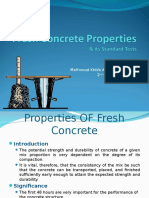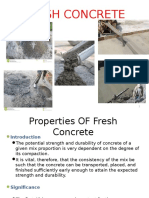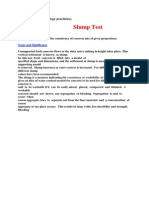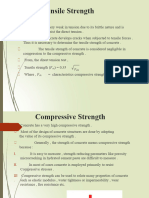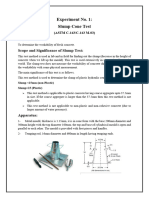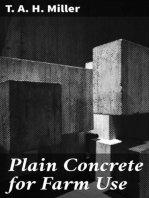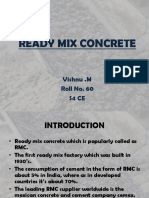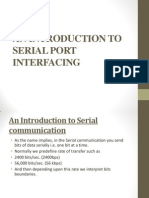0 ratings0% found this document useful (0 votes)
162 viewsTest
Test
Uploaded by
AGunaSekaranConcrete is a mixture of cement, aggregate (crushed stone and sand), and water. It is tested in both fresh and hardened states. Tests of fresh concrete include slump, flow, and compaction factor tests to determine workability. The slump test measures the amount of slump or subsidence of a cone-shaped mound of concrete. Compaction factor tests measures the degree of compaction achieved. Hardened concrete is tested for compressive, tensile, and flexural strength at 7 and 28 days. Proper mix design, placement, compaction, and curing are needed to produce high quality, strong concrete.
Copyright:
© All Rights Reserved
Available Formats
Download as PPTX, PDF, TXT or read online from Scribd
Test
Test
Uploaded by
AGunaSekaran0 ratings0% found this document useful (0 votes)
162 views23 pagesConcrete is a mixture of cement, aggregate (crushed stone and sand), and water. It is tested in both fresh and hardened states. Tests of fresh concrete include slump, flow, and compaction factor tests to determine workability. The slump test measures the amount of slump or subsidence of a cone-shaped mound of concrete. Compaction factor tests measures the degree of compaction achieved. Hardened concrete is tested for compressive, tensile, and flexural strength at 7 and 28 days. Proper mix design, placement, compaction, and curing are needed to produce high quality, strong concrete.
Original Description:
sekarce@ymail.com
Copyright
© © All Rights Reserved
Available Formats
PPTX, PDF, TXT or read online from Scribd
Share this document
Did you find this document useful?
Is this content inappropriate?
Concrete is a mixture of cement, aggregate (crushed stone and sand), and water. It is tested in both fresh and hardened states. Tests of fresh concrete include slump, flow, and compaction factor tests to determine workability. The slump test measures the amount of slump or subsidence of a cone-shaped mound of concrete. Compaction factor tests measures the degree of compaction achieved. Hardened concrete is tested for compressive, tensile, and flexural strength at 7 and 28 days. Proper mix design, placement, compaction, and curing are needed to produce high quality, strong concrete.
Copyright:
© All Rights Reserved
Available Formats
Download as PPTX, PDF, TXT or read online from Scribd
Download as pptx, pdf, or txt
0 ratings0% found this document useful (0 votes)
162 views23 pagesTest
Test
Uploaded by
AGunaSekaranConcrete is a mixture of cement, aggregate (crushed stone and sand), and water. It is tested in both fresh and hardened states. Tests of fresh concrete include slump, flow, and compaction factor tests to determine workability. The slump test measures the amount of slump or subsidence of a cone-shaped mound of concrete. Compaction factor tests measures the degree of compaction achieved. Hardened concrete is tested for compressive, tensile, and flexural strength at 7 and 28 days. Proper mix design, placement, compaction, and curing are needed to produce high quality, strong concrete.
Copyright:
© All Rights Reserved
Available Formats
Download as PPTX, PDF, TXT or read online from Scribd
Download as pptx, pdf, or txt
You are on page 1of 23
Concrete
concrete is a mixture of cement, coarse aggregate (metal or
crushed stone) , fine aggregate (sand of size < 4.75mm)and
water .
The prepared concrete is in semi-liquid stage this is as called
fresh concrete or green concrete or plastic concrete.
Cement initial setting time not less than 30 min
Cement Final setting time not more than 10 hours
After 28 day concrete fully hardened
Various tests can be carried out on fresh concrete . All these
test are used to determine the workability of concrete .
Some important test carried out on fresh concrete are
Slump cone test
Flow Test and
Compaction factor test.
Slump cone test
Slump cone test is used to determine the
workability of concrete.
This test can be conducted in the field (or) in
laboratory .
This test is not suitable for very wet (or) very dry
concrete .
APPARATUS
Cone is about 20cm@ bottom gradually reduced to
10cm at top. With a height of 30mm.
Steel tamping rod 16mm dia , 60mm long
The vessel is placed on a flat non-absorbent surface
Then specimen is filled with concrete mix in four
different layers of equal thickness.
Compact each layer with 25 blows
Then cone is lifted up wards from the concrete
immediately
10mm
30mm
20mm
Slump commonly adopted for
various concrete mixes
Sl.no Type of concrete work Slump adopted in mm
1
2
3
4
5
6
Concrete for road work
Beam and slabs
Columns, retaining walls and thin
vertical members etc.
Impermeable work
Vibrated concrete
Mass concrete
20 to 30
50 to 100
75 to 150
75 to 150
12 to 25
25 to 50
Compaction factor test
In the compaction factor test the degree of workability
of concrete is measured in terms of internal energy
required to compact the concrete thoroughly .
Apparatus
Upper hopper
Lower hopper
Cylinder
Procedure involved in compaction factor test
A standard amount of concrete is allowed to fall from a
standard height
procedure
The concrete sample to be tested is first placed in the
top hopper.
The trap door is opened and concrete is allowed to fall
to the lower hopper.
Similarly from the lower hopper concrete is allowed to
fall in the cylinder kept below.
Now the cylinder is weighed and the weight is called as
weight of partially compacted concrete .
Now the cylinder is emptied and refilled with concrete
by the same sample .it is vibrated heavily and weighted.
Compaction factor=weight of partially compacted concrete
weight of fully compacted concrete
Workability
compaction factor corresponding
slump
Very low
Low
Medium
high
0.80
0.85
0.92
0.95
0 to 25mm
25 to 50mm
50 to 100mm
100 to 180mm
FLOW TEST
The spread or the flow of the concrete is measured and
this flow is related to workability
Procedure
The mould is kept on the center of the table and is filled
with concrete in two layer.
Each layer is rammed 25 times with a tamping rod 1.6 cm
in dia and 61cm long rounded at lower tamping end.
The mould lifted vertically upward and concrete stands on
its own without support.
The table is then raised and dropped 12.5mm height for 15 times
(or)for 15 seconds.
The diameter of the spread concrete is measured in about 6
directions to the nearest 5mm and the average spread is noted .
Flow , percent =(spread diameter in cm-25)*100/25
The value could range anything from 0 to 150 percent
Testing for hardened concrete
Compressive strength test.
Flexural strength test.
Split-tension test .
Compressive strength test.
The Compression test is used to determine the hardness of
cubical (or) cylindrical specimens of concrete.
The strength of a concrete specimen depends upon concrete ,
aggregate bond, w/c ratio ,curing temperature ,and age and
size of specimen .
procedure
The largest nominal size of the aggregates does not
exceed 20mm
Each layer of the concrete is compacted by 25 to 35
blows .
Then remolded the concrete after 24 hours.
Submerged the specimen in clean water.
Then the specimen is tested after 7days and 28days .
Normally strength of cylindrical specimen is taken as
0.8 times of the strength of cubical.
Compressive strength= maximum load
cross-sectional area of cube
Flexural strength test
The concrete is strong in compression & weak in tension.
Stress develop in concrete due to drying shrinkage.
In this test load is applied.
central .
Two-point
central Two-point
LOAD LOAD
L/2 L/2 L/2 L/2 L/2
L L
Size of specimen = 15x15x70cm
Beam size = 10x10x50cm
Split- tension test
This is an indirect tension test. In this test cylindrical
specimen is placed horizontal.
The load is applied until failure of the cylinder along
the vertical diameter .
But a larger portion about 5/6
th
of the depth is
subjected to tension stress.
Quality of concrete
In order to make concrete a quality one there division are
used
Engineering division
Manufacturing division
Piecing division
Engineering division
look after all forms reinforcement details and
installation of all embedded parts.
Manufacturing
This division takes care of the control of
materials , batching and mixing of concrete.
Placing division
This division take care of placing other
subsequent works.
Following are the General requirements for quality of
concrete
Air bubbles should be completely removed from the
concrete .
Compaction of concrete should be minimize the voids
presented in the concrete.
A adequate curing for 28 days is done.
To attain high quality of concrete
Proper ingredients
Proper batching & mixing
Proper transportation
Careful placing
Adequate curing
Careful removal of form work
Necessary finishing
Admixture
Admixture
These are substances other than cement , aggregate and
water , those are used to modify the properties of
concrete .
Admixture are two type
Mineral and
Chemical admixture
Mineral admixture
Silica fume
Rice husk ash
Ground granulated blast furnace slag
Fly ash
Chemical admixture
Accelerators(decreases the setting time)
Retarders(increase the setting time)
Plasticizer
Super plasticizer
Dpc and water proof material
Thank you
You might also like
- Slump TestDocument18 pagesSlump Testmustakim_sedek83% (36)
- Effect of Pellet Basicity and MgO Content On The Quality and Microstructure ofDocument11 pagesEffect of Pellet Basicity and MgO Content On The Quality and Microstructure ofKrol Prieto100% (1)
- Laminating Troubleshooting FinalDocument25 pagesLaminating Troubleshooting FinalHabteyes Abate100% (2)
- Il Top 1831&1832 CN enDocument51 pagesIl Top 1831&1832 CN enزروقي موسيNo ratings yet
- Concrete Test Cube ProcedureDocument4 pagesConcrete Test Cube ProcedureEE007CA67% (6)
- Alarmes - Fiberhome (Ok) PDFDocument282 pagesAlarmes - Fiberhome (Ok) PDFiury garcia100% (2)
- Concrete TestDocument19 pagesConcrete Testmohammad hafodyNo ratings yet
- Slump Test Report PMMDocument7 pagesSlump Test Report PMMLuqman Yusof83% (12)
- Concrete TestDocument19 pagesConcrete Testmohammad hafodyNo ratings yet
- Mi Design of ConcreteDocument119 pagesMi Design of ConcreteRufesh YadavNo ratings yet
- Mahmoud Khlifa Almoghazy Aliraqi 2 Civil Engineering Section 21Document119 pagesMahmoud Khlifa Almoghazy Aliraqi 2 Civil Engineering Section 21Nasir AlsalehNo ratings yet
- Properties of Fresh Concrete PresentationDocument38 pagesProperties of Fresh Concrete PresentationKannan Kandappan100% (1)
- Testing Concrete ConstructionDocument10 pagesTesting Concrete ConstructionKaye Ibañez CastilloNo ratings yet
- Concrete Slump TestDocument19 pagesConcrete Slump TestGhayas Ud-din DarNo ratings yet
- Errors of Observation in Concrete Testing LabsDocument30 pagesErrors of Observation in Concrete Testing LabsSuryasis Dasgupta25% (4)
- Material TestingDocument88 pagesMaterial TestingHenock ShewasemaNo ratings yet
- Module 3Document14 pagesModule 3Fuck YouNo ratings yet
- Cube Compressive Strenght TestDocument6 pagesCube Compressive Strenght TestMM tarasNo ratings yet
- CH - 05 Testing of Concrete and Quality ControlDocument16 pagesCH - 05 Testing of Concrete and Quality ControlAbhinav RJNo ratings yet
- Different Standards of ConcreteDocument23 pagesDifferent Standards of ConcreteShubham FulsoundarNo ratings yet
- Hardened ConcreteDocument20 pagesHardened Concretefaimy josephNo ratings yet
- Watercement RatioDocument5 pagesWatercement RatioVeeNo ratings yet
- properties of conreteDocument53 pagesproperties of conretethundererprinceNo ratings yet
- Testing of Concrete Mix DesignDocument3 pagesTesting of Concrete Mix DesignHassan KhattakNo ratings yet
- 7 - Hardened PropertiesDocument51 pages7 - Hardened Propertiestahsinkabir4590No ratings yet
- Concrete 180905115821Document83 pagesConcrete 180905115821A AaNo ratings yet
- ConcreteDocument83 pagesConcreteashwin.j.nair03No ratings yet
- Concrete Slump TestDocument11 pagesConcrete Slump TestMarie Fe Bermido100% (1)
- Compressive Strength of Concrete 1Document6 pagesCompressive Strength of Concrete 1Christabel AbbeyNo ratings yet
- Mazane MaterialsDocument9 pagesMazane MaterialsOtsile Mos MosweuNo ratings yet
- MODULE-5-TESTING-FOR-CONCRETE SDocument11 pagesMODULE-5-TESTING-FOR-CONCRETE SMarc AndrewNo ratings yet
- Importance of Practical Training 9Document27 pagesImportance of Practical Training 9Javaid SalamNo ratings yet
- Concrete Day 1Document36 pagesConcrete Day 1jaishpratapsinghNo ratings yet
- Compressive Strength of ConcreteDocument9 pagesCompressive Strength of ConcreteAmos kipruto100% (1)
- Tests For Concrete - NotesDocument31 pagesTests For Concrete - Notessrushtideokar0537No ratings yet
- Reference Notes - Tests For ConcreteDocument21 pagesReference Notes - Tests For ConcreteMitali KhedkarNo ratings yet
- Construction Materials Notes NCDocument49 pagesConstruction Materials Notes NCfrancisngirazi04No ratings yet
- Fresh ConcreteDocument34 pagesFresh Concreteahmedalkastawy19No ratings yet
- ConcreteDocument83 pagesConcreteAdilkhan PathanNo ratings yet
- CementsDocument11 pagesCementsmd nasirNo ratings yet
- Daja 6Document15 pagesDaja 6محمد الدعجةNo ratings yet
- Lecture 1 Unit 3Document9 pagesLecture 1 Unit 3jatin saiwalNo ratings yet
- Cylinder Mould (100mm X 200mm or 150mm X 300mm or 300mm X 600mm) Bulled-Nosed Rod (16mm Diam. & 600mm Long) Steel FloatDocument3 pagesCylinder Mould (100mm X 200mm or 150mm X 300mm or 300mm X 600mm) Bulled-Nosed Rod (16mm Diam. & 600mm Long) Steel FloatStain HecNo ratings yet
- Concrete and Reinforced ConcreteDocument116 pagesConcrete and Reinforced ConcreteNikki OloanNo ratings yet
- 5 Must-Know Types of Concrete Testing For Civil Engineers: Civilverse Admin 25 July 2021Document9 pages5 Must-Know Types of Concrete Testing For Civil Engineers: Civilverse Admin 25 July 2021tipu88ceNo ratings yet
- Chapter2 - Concrete Works at Construction SiteDocument38 pagesChapter2 - Concrete Works at Construction SiteSyahierah RedzuanNo ratings yet
- Slump TestDocument2 pagesSlump TestShahid AliNo ratings yet
- Concrete Testing MethodsDocument7 pagesConcrete Testing Methodsstephenhcc1No ratings yet
- Testing Fresh Concrete. Slump TestDocument6 pagesTesting Fresh Concrete. Slump TestkhaledNo ratings yet
- 3 Methods of Determining Workability of ConcreteDocument4 pages3 Methods of Determining Workability of Concretesuryakantame100% (1)
- Slump Cone Test ASTM C 143Document4 pagesSlump Cone Test ASTM C 143YasirNo ratings yet
- Unit 1 Handout # 3Document6 pagesUnit 1 Handout # 3Oumar CoulibalyNo ratings yet
- Interview Questions (Concrete Related)Document25 pagesInterview Questions (Concrete Related)Muhammad Ahmad100% (1)
- Slump Test TKYDocument18 pagesSlump Test TKYSurendren SurenkkNo ratings yet
- Cem Lec10Document13 pagesCem Lec10arupanandasahu0245No ratings yet
- Admixtures in ConcreteDocument3 pagesAdmixtures in ConcreteAlejandroGonzagaNo ratings yet
- Karadeniz Technical University Faculty of Engineering Department of Civil EngineeringDocument14 pagesKaradeniz Technical University Faculty of Engineering Department of Civil EngineeringAsena AkturkNo ratings yet
- Cem Concrete 2Document13 pagesCem Concrete 2Sohan Subhankar MohantyNo ratings yet
- Water-Cement RatioDocument12 pagesWater-Cement RatioOPIO WALTERNo ratings yet
- Fresh ConcreteDocument57 pagesFresh ConcreteAkshaykumar Rathod100% (1)
- 1 Slump Cone TestDocument5 pages1 Slump Cone TestWaqas Muneer KhanNo ratings yet
- The Rudiments Of Practical Bricklaying - In Six Sections: General Principles Of Bricklaying, Arch Drawing, Cutting, And Setting, Different Kinds Of Pointing, Paving, Tiling, Materials, Slating, And Plastering, Practical Geometry MensurationFrom EverandThe Rudiments Of Practical Bricklaying - In Six Sections: General Principles Of Bricklaying, Arch Drawing, Cutting, And Setting, Different Kinds Of Pointing, Paving, Tiling, Materials, Slating, And Plastering, Practical Geometry MensurationRating: 5 out of 5 stars5/5 (1)
- Meat and Bone Crusher & Animal Crusher Ver. 1.3Document2 pagesMeat and Bone Crusher & Animal Crusher Ver. 1.3TG-MachinesNo ratings yet
- Method Statement For Replacement of Motors - Olayan Power BoxDocument5 pagesMethod Statement For Replacement of Motors - Olayan Power BoxSaravana KumarNo ratings yet
- TC358743XBG Datasheet en 20171026Document18 pagesTC358743XBG Datasheet en 20171026Vasilij PupkinNo ratings yet
- UnethicalDocument14 pagesUnethicalAbdilatif Alcc100% (1)
- Appendix 2 Com. Proposal Rev BDocument9 pagesAppendix 2 Com. Proposal Rev BAHMEDNo ratings yet
- HandOut - Basic Computer MaintenanceDocument10 pagesHandOut - Basic Computer MaintenancekathirdcnNo ratings yet
- 4le1da07 DGK25B 01Document46 pages4le1da07 DGK25B 01Leo BurnsNo ratings yet
- TRANSMISSION LINE COMMISSIONING Publication - No.292 PDFDocument46 pagesTRANSMISSION LINE COMMISSIONING Publication - No.292 PDFmohit mudgal100% (6)
- OmniSwitch 6450 Series Getting Started GuideDocument22 pagesOmniSwitch 6450 Series Getting Started GuidemludasNo ratings yet
- HSC Ict Chapter 2Document26 pagesHSC Ict Chapter 2BappiNo ratings yet
- TGN (E) 205Document22 pagesTGN (E) 205Arun dasNo ratings yet
- Fiu-0000056-24 ReportDocument14 pagesFiu-0000056-24 Reportmary.divirgilioNo ratings yet
- CMOS VLSI Workshop AEC RavisysDocument3 pagesCMOS VLSI Workshop AEC RavisysBijoy GoswamiNo ratings yet
- Software Testing: Govt. of Karnataka, Department of Technical EducationDocument9 pagesSoftware Testing: Govt. of Karnataka, Department of Technical EducationnaveeNo ratings yet
- Thermo Setting PlasticDocument33 pagesThermo Setting PlasticAnkit AgrawalNo ratings yet
- Manual Maq LLenado Liga FrenoDocument40 pagesManual Maq LLenado Liga FrenoEberthsonNo ratings yet
- SB-15-022 23K HD Comfort Ride ConversionDocument49 pagesSB-15-022 23K HD Comfort Ride ConversionPhil B.No ratings yet
- Ready Mix ConcreteDocument28 pagesReady Mix ConcreteLance Sabu100% (1)
- SERIAL - PORTDocument17 pagesSERIAL - PORTaamirraihanNo ratings yet
- Cub Cadet Parts Manual For Model 2165 Tractor SN 326006 and UpDocument7 pagesCub Cadet Parts Manual For Model 2165 Tractor SN 326006 and Upbessie100% (64)
- Hydro GeologyDocument127 pagesHydro GeologyCR worldNo ratings yet
- 2019level8honours Bachelordegreecourses: Code Course 2019 2018 Code Course 2019 2018Document3 pages2019level8honours Bachelordegreecourses: Code Course 2019 2018 Code Course 2019 2018Ciaran O'keeffeNo ratings yet
- User Manual-Muse5 enDocument31 pagesUser Manual-Muse5 enandraramo1986No ratings yet
- AEROMATIC LTD. Fluid Bed Dryer PDFDocument13 pagesAEROMATIC LTD. Fluid Bed Dryer PDFManuel Molina KorsNo ratings yet
- 20 Microns Coated Calcium Carbonate 1t VDocument1 page20 Microns Coated Calcium Carbonate 1t VChandrakantNo ratings yet
- Factory and Machinery (Noise Exposure) RegulationsDocument1 pageFactory and Machinery (Noise Exposure) RegulationsAeyrul KhairulNo ratings yet










